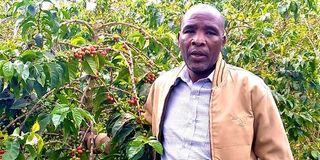Narok farmers embrace coffee

Joseph Soi at his three-acre coffee farm in Olmekenyu, Narok South. Members of Narok South Baraka Coffee Co-operative Society sell their produce to the Coffee Management Service in Eldoret, Uasin Gishu County.
Narok County is known for wheat, maize and potato farming. However, some farmers are opting for a new crop – coffee.
Joseph Soi is the vice-chairman of Narok South Baraka Coffee Cooperative Society, which has 120 members. The co-op operates in Olmekenyu, about 25 kilometres from Ololulung’a town.
“We established a nursery in 2014 and planted seedlings in 2015. I started with half an acre, expanded to one and now have three acres under coffee,” the 52-year-old, who grows the Batian variety, says.
Soi harvests five to seven kilos of berries per tree every season.
“I harvest 1,400 to 1,600 kilos every two weeks for four consecutive months,” he says.
The farmer uses organic manure when planting and, applies CAN after six months. He uses 50g of the top-dressing fertiliser per bush and doubles the amount when they start producing berries.
Members of the co-op sell their produce to the Coffee Management Services in Eldoret.
“The price per kilo varies from Sh270 to Sh500,” Soi says.
Their main problem is getting fertiliser, pesticides and other inputs. The farmers have to travel to as far as Kericho for the inputs.
Soi bought a manual pulping machine for Sh40,000. He, however, admits that the job is tedious. He can only manage a tonne for a day.
Land expansion
Soi intends to expand land under coffee to 10 acres.
“I no longer struggle to pay school fees for my children. A sack of coffee provides my family with enough money to buy maize that lasts for a whole year,” Soi says, adding that he has begun talking to neighbours to embrace coffee growing.
Christine Bii is a member of the co-op too. Like Soi, she grows the Batian variety.
“I started with 400 bushes on half an acre in 2019 but have increased the number to 600,” she says adding that hundreds of others dried due to drought.
“We get the seedlings from Nandi Hills.”
When planting, Ms Bii ensures the plants are two metres apart. A hole is two feet deep, and two feet wide. She uses farmyard manure during planting.
Narok South Baraka Coffee Co-op members take their berries to one collection point before the produce is transported to Eldoret.
“Coffee berry disease is one of our greatest challenges we face,” she says, adding that the disease is rampant in Olmekenyu.
Whiteflies also attack the plants. These are usually controlled by pesticides. Ms Bii also bought a pulping kit for Sh40,000.
The berries are pulped after harvesting. She then soaks the pulped berries for two days. The pulp is dried before being taken to the store to await the journey to Eldoret. Co-op chairman Philip Maritim started growing coffee in 2012.
“The Coffee Research Institute helped me and two others write a proposal to establish a nursery in 2014. It was an EU project aimed at improving and expanding coffee growing in Kenya,” Maritim says, adding that they received Sh4.5 million.
“We have around 40 acres of coffee and farmers are happy. We wanted to empower the community economically,” says Maritim who has three acres of the Batian variety. He harvests around five kilos of coffee from one tree every year.
“I wish Narok gets an agrovet that sells fertiliser and other inputs soon,” he says.
Sell to members
The co-op intends to start stocking the inputs and selling them to members and other farmers.
“Some members grow Ruiru 11. The two varieties are almost similar,” says Maritim.
“Quality cannot be the same if every farmer does pulping at home. We hope to get resources and buy a new machine that will ensure pulping is at one point.”
For a truck to make the trip to Eldoret, the society must ensure it has at least 70 bags of coffee.
Some 10 per cent of a farmer’s income is deducted to carter for office work and transport.
Michael Kurgat, an adviser at Modez Organic Agrovet in Fort Ternan, tells farmers to ensure their soil is analysed before embarking on coffee growing.
“The ideal pH for coffee is 4.4 to 5.4 as that is slightly acidic. Batian grows well in sandy loam and red volcanic soil. Both should have good organic matter,” he says.
Kurgat adds that the variety thrives in areas with a rainfall of 2,000-2.300mm, distributed properly in the year.
“Temperature should range between 10 and 28 degrees Celsius. Lower than that and the leaves will be distorted,” he says.
The altitude should be 1,400-2,000 metres above sea level.
“The national average for coffee is two to three kilos per tree. When taken care of properly, Batian should give a higher yield. The change of cycle, rain, temperature and soil pH also determine harvest,” he says.
Batian matures in 18 months. It becomes a fully grown tree after four to seven years.
“One needs to be cautious when growing coffee as this is a perennial crop. Land preparation is key. If not done properly, expect low yields for as long as the tree is standing,” he says.
“When planting, apply compost manure and mycorrhizal biofertiliser for root development.”





